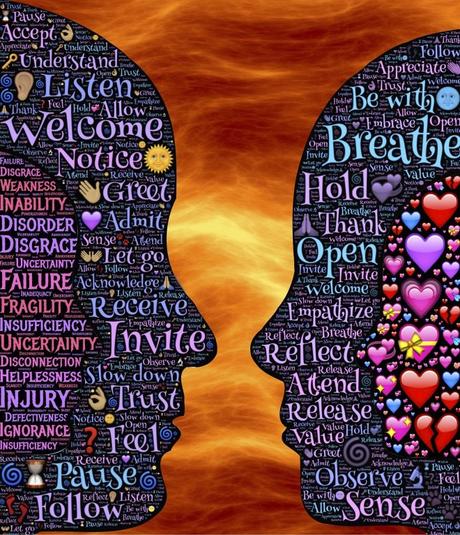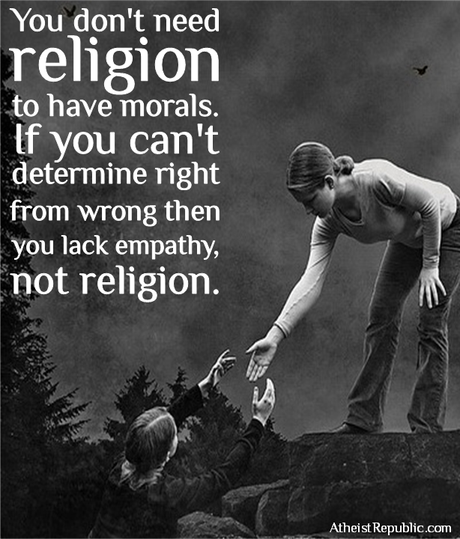 Showing empathy to another person is a highly moral thing to do. But can empathy ground morality itself? Is the following meme right?
Showing empathy to another person is a highly moral thing to do. But can empathy ground morality itself? Is the following meme right?

I think the point being made here is that human morality is actually best grounded on the ability of people to empathise with others, to put oneself in their shoes and to sense where they are coming from. So, differentiating right from wrong simply requires empathy. And – by the way – religion is irrelevant. (of course)
Here’s a more rigorous version of this kind of argument proposed by Michael Stolte:
- We can come to know the warmth or coldness of an agent’s motives by empathy.
- Moral goodness or virtue consists in being a warm-hearted person, a badness or vice in being cold-hearted toward others.
- So, we can come to know the virtue or vice of others by empathy.[1]
I’m totally a fan of empathy. We need more of it in the world today! There would be less conflict if we took time to understand the other’s position. I myself have made it a priority to practice empathy wherever and whenever I can. I’ve not been as good as I could have – I need to improve. But – I want to.
Here’s the problem, tho. To suggest that human morality can be defined as our ability to sense where the other person is warm or cold hearted? Or to choose our moral actions solely on the basis of the other person’s cold or warm heartedness? It just doesn’t make sense.
#1 – Behaving Morally is not about being Warm Hearted
I can very easily seem to be doing the right thing, when inside I am not. Look, to be honest I can leave the house and speak to people very warmly all evening, all the while knowing that before I left I had an argument with my wife and I said some pretty unkind things that will need to be apologized for. Warm heartedness is good for building relationships with people, but it says nothing about my own virtuous state.
Personal morality is about showing virtue.
Surely a virtuous person is someone who shows courage. When they face undeserved accusation or persecution, they seek to courageously find a solution to the problem. They don’t just run away or hit back randomly. They exercise courage…and add to that patience and wisdom too. These are measures of virtue.
What about honesty? You don’t need to be particularly warm hearted to be honest. If you are the Finance Director of your company, honesty will pay dividends and may ensure the survival of the company, while empathy may help whilst chatting with your colleagues over lunch. Honesty is a truly virtuous character trait.
So – warm heartedness is great, but it doesn’t get you to becoming a moral, virtuous person.
#2 – Being Too Empathic Could Lead to Immoral Decisions
I think there are scenarios where relying too much on empathy could lead us to make immoral choices. What do I mean?
Here’s a terrible and extreme example. Imagine there is another 9-11 style terror attack. You, as a commander in the US Air Force, suddenly find yourself with two F19’s tailing a full Boeing 777 which is heading towards Manhattan. On board, the terrorists have stated their intention to recreate the horrific events of that previous tragedy. Also on board are over 460 passengers and crew members. Looking at the manifest – you have families on board. What do you do?
Well, if the moral action is dictated solely by empathy, you are going to be in a pickle. You will feel for all the thousands of people and fire crews working in Manhattan. But you will also feel for all the innocent people on board the plane! So, on empathy alone, are you going to make the tough and tragic call to shoot down the plane? You’ll probably be left stumbling over the right thing to do. And surely waiting too long, will result in bad consequences that could have been avoided. Surely an immoral choice?
You might say, well we need to consider the number of people involved here in this situation. There are fewer people on the plane…so fewer lives would be lost and many more would be saved. In this case, you are making a moral argument for the action based on practical factors, a sort of utilitarian approach. Well – that is fine, but you may have had to detach yourself from your empathy to make that clear headed decision? At the very least, empathy has failed in allowing you to choose right from wrong. So you’ve had to switch to something else – utility.
#3 Morality Isn’t About How Anyone Feels
What I mean is that, while people’s feelings are important, morality is about something different. One way of defining morality is like this. Acting morally is about being disposed to actively praise or blame someone based on a baseline expectation that everyone shares the same disposition you do.[2]
So, as a shop keeper, when you see the young kid come in, pick up a 6 pack of beer, and walk out of the shop, you are justified in actively responding to this situation. You run after him. You expect that everyone knows you should NOT steal. It is immoral. Sure, it’s also illegal. But first, its morally wrong. And knowing that everyone is on board with that perspective, you don’t just wave at him as he leaves. You chase him to get the beers back. Even if no human beings existed to steal beers from your shop…stealing would still be morally wrong.
Now – if you are a moral relativist you will have some issues with me there. (!) But my main point here is that empathy played no part at all in the situation I described. An overly empathic shop keeper might have let the kid get away with it. But he would not be doing that kid any good – he would be harming him morally. That kid needs to know there are consequences, right? If he doesn’t learn consequences, he might sear the moral capacity within him so badly that he grows up to think he can do whatever he likes.
Morality isn’t about how people feel. Rather, it’s about knowing that everyone knows there’s just some things that you don’t do, and others that you can do.
#4 There Is a Grounding for Objective Morality – God
To determine what is objectively right from wrong – you need an absolute standard to measure against. We do this all the time in many walks of life, and also in moral issues. When someone steals my beer, they are doing something that’s objectively wrong. And so – I will rightly challenge them. When something is objectively wrong or objectively right, it means that the moral status of that action is independent of people. Even if there are no people, the moral law stands.
So – if there are no people to ground this moral law on, where is it grounded from? It’s not religion, because religions are a human expression. Religions involve humans, if there are no humans then no religion. So how do we ground this moral law?
The Moral Law sure has power over us in life. People are always taking moral stands on one thing or another, whether it’s racism, the rights of the unborn child or poverty. Where does this powerful law that affects everyone – come from? It can’t come from people? Surely the only one capable of grounding such a thing is the creator of the universe?
[1] M. Slote, Moral Sentimentalism, (New York: Oxford University Press, 2010), quoted in Antii Kauppinen, “Empathy as the Moral Sense,” Philosophia (2017) 45:867-879.
[2] Antii Kauppinen, Empathy as the Moral Sense, Philosophia (2017) 45:867-879.
